诗经英文欣赏
- 格式:ppt
- 大小:866.00 KB
- 文档页数:10
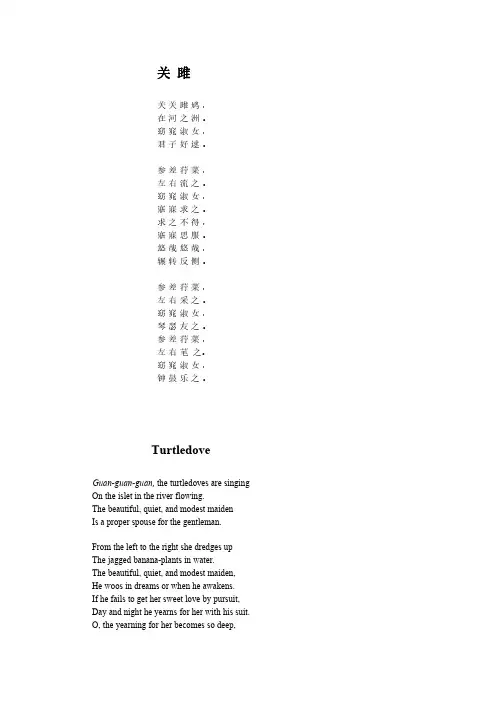
关雎关关雎鸠,在河之洲。
窈窕淑女,君子好逑。
参差荇菜,左右流之。
窈窕淑女,寤寐求之。
求之不得,寤寐思服。
悠哉悠哉,辗转反侧。
参差荇菜,左右采之。
窈窕淑女,琴瑟友之。
参差荇菜,左右芼之。
窈窕淑女,钟鼓乐之。
TurtledoveGuan-guan-guan,the turtledoves are singing On the islet in the river flowing.The beautiful,quiet,and modest maidenIs a proper spouse for the gentleman. From the left to the right she dredges up The jagged banana-plants in water.The beautiful,quiet,and modest maiden, He woos in dreams or when he awakens.If he fails to get her sweet love by pursuit, Day and night he yearns for her with his suit. O,the yearning for her becomes so deep,He tosses from side to side with no sleep.From the left to the right she gently plucksThe jagged banana-plants in water.Playing the stringed instrument and the harp,He makes friends with the quiet,modest maiden.From the left to the right she mildly picksThe jagged banana-plants in water.Playing the sound carillon and the drum,He pleases the quiet and modest maiden.赏析《诗经》是我国古代最早的一部诗歌总集,也是人类历史上最早的诗歌创作的一部分,共有305篇,包括从周初(公元前十一世纪)到春秋中期(公元前七世纪)约500年间的作品,其中大部分是经过整理的古人口头歌谣。
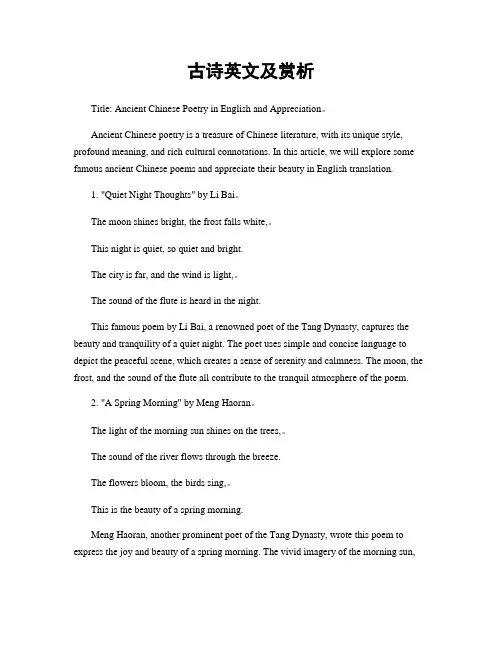
古诗英文及赏析Title: Ancient Chinese Poetry in English and Appreciation。
Ancient Chinese poetry is a treasure of Chinese literature, with its unique style, profound meaning, and rich cultural connotations. In this article, we will explore some famous ancient Chinese poems and appreciate their beauty in English translation.1. "Quiet Night Thoughts" by Li Bai。
The moon shines bright, the frost falls white,。
This night is quiet, so quiet and bright.The city is far, and the wind is light,。
The sound of the flute is heard in the night.This famous poem by Li Bai, a renowned poet of the Tang Dynasty, captures the beauty and tranquility of a quiet night. The poet uses simple and concise language to depict the peaceful scene, which creates a sense of serenity and calmness. The moon, the frost, and the sound of the flute all contribute to the tranquil atmosphere of the poem.2. "A Spring Morning" by Meng Haoran。
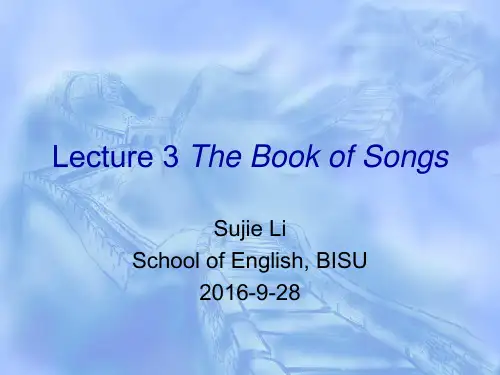
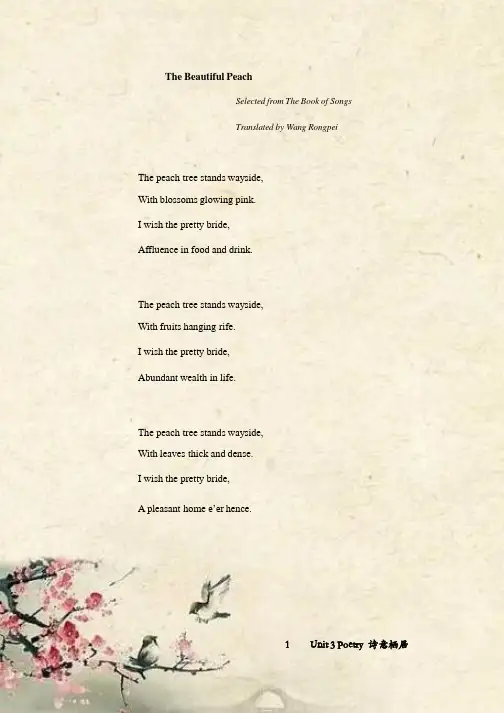
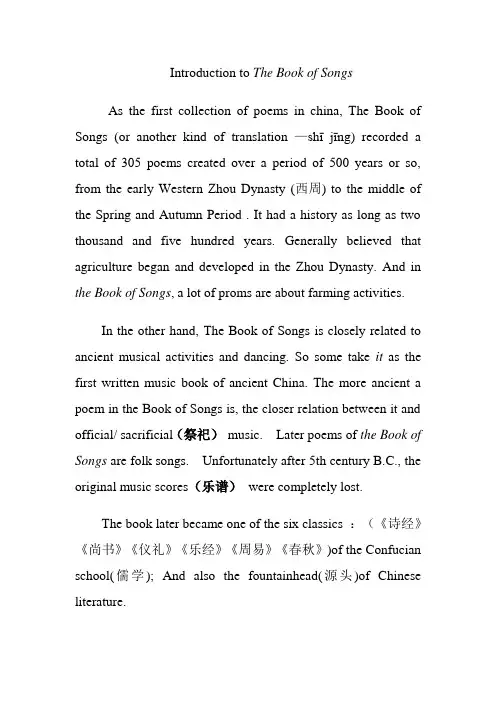
Introduction to The Book of SongsAs the first collection of poems in china, The Book of Songs (or another kind of translation —shī jīng) recorded a total of 305 poems created over a period of 500 years or so, from the early Western Zhou Dynasty (西周) to the middle of the Spring and Autumn Period . It had a history as long as two thousand and five hundred years. Generally believed that agriculture began and developed in the Zhou Dynasty. And in the Book of Songs, a lot of proms are about farming activities.In the other hand, The Book of Songs is closely related to ancient musical activities and dancing. So some take it as the first written music book of ancient China. The more ancient a poem in the Book of Songs is, the closer relation between it and official/ sacrificial(祭祀)music. Later poems of the Book of Songs are folk songs. Unfortunately after 5th century B.C., the original music scores(乐谱)were completely lost.The book later became one of the six classics :(《诗经》《尚书》《仪礼》《乐经》《周易》《春秋》)of the Confucian school(儒学); And also the fountainhead(源头)of Chinese literature.Generally the Book of Songs would be divided into 3 sections: Folk Songs, Odes[əʊdz], and Hymns[him]. And Hymns[him] is divided into Greater Odes & Lesser Odes).Introduction—Folk Songs•Songs NO. 1-160.•Contains 15 groups of songs with folk features, from 15 geographical areas(地理区域).•These folk songs are Rich in content, dealing with labor, love affairs, marriage, hardships of the unprivileged(弱势群体), and protests against tyranny(暴政) and war.Introduction—Odes•In total 105 poems, NO.161-265.•Some poems overlap with the Folk Song in folk attributes, and others composed for banquets and feasts(宴会和节日). •2 kinds: Greater Odes大雅, Lesser Odes小雅.Introduction—Hymns•No. 266-305•It is divided into the Zhou hymns (周颂), Lu hymns (鲁颂), and Shang hymns (商颂), i.e., hymns from differentdynasties (王朝), and the home state of Confucius. •Most of these are formal, ritual hymns that praise the ancestors envisioned (展望), in the rites (仪式).Introduction•Totally the subject matter of the poems varies greatly from one section to another.•While in the presentation of theme the tone may be positive or censuring, the later editor of the book, Confucius (孔子), commented that the poems could be described as “Havingno depraved thoughts(思无邪)”.Style of the Book of Songs•In general, straightforward and natural. •Typical of ancient literature: the immediacy (直接反映) of imagery and persuasive musical quality.•The poems are rich in metaphors (隐喻) and similes (明喻), both direct (兴) and indirect(比), as well as narrative displays (赋).Style of the Book of Songs•The majority of the poems were composed spontaneously(自发地) before specific audiences. •Poems: no title, usually the first two Chinese characters will be used as the title.•Poets: anonymous (匿名的) except three.The Book of Songs: Guan Ju(关雎)•The most famous and well-known poem in Shijing. •The Ode celebrates the virtue of the bride of King Wen of Zhou Dynasty(周文王).•His name in Chinese is literally synonymous with “culture” (文) or “civilization.” H e is remembered for his piety towards the gods and ancestors, and his concern for the well-being of the people.Book of Songs: “Rats”•Strong criticism of the situation at that time. •Being a farmer, one has to work very hard for survival but officials are like big rats eating their production.Influence of the Book of Songs•The Book of Songs occupies an important place in the history of Chinese literature.•The Book of Songs has exerted a profound influence upon the entire course of the development of Chinese poetry.Thank You !。
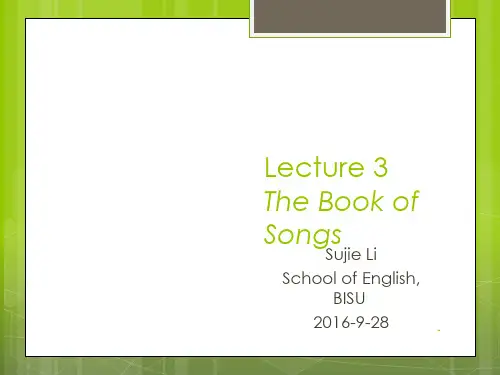
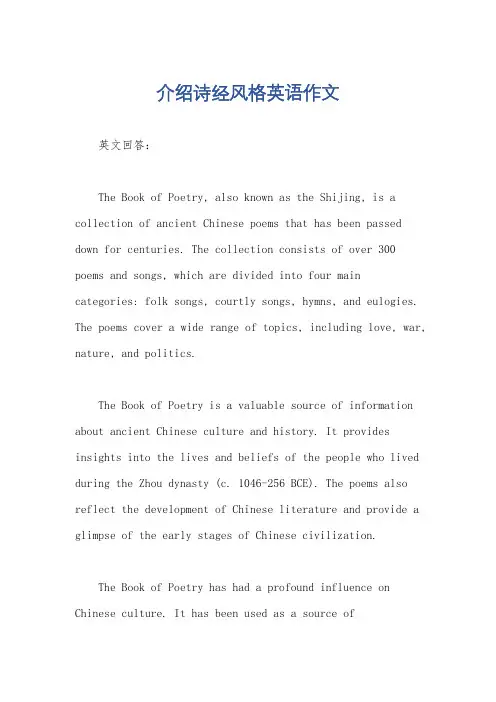
介绍诗经风格英语作文英文回答:The Book of Poetry, also known as the Shijing, is a collection of ancient Chinese poems that has been passed down for centuries. The collection consists of over 300 poems and songs, which are divided into four main categories: folk songs, courtly songs, hymns, and eulogies. The poems cover a wide range of topics, including love, war, nature, and politics.The Book of Poetry is a valuable source of information about ancient Chinese culture and history. It provides insights into the lives and beliefs of the people who lived during the Zhou dynasty (c. 1046-256 BCE). The poems also reflect the development of Chinese literature and provide a glimpse of the early stages of Chinese civilization.The Book of Poetry has had a profound influence on Chinese culture. It has been used as a source ofinspiration by poets, writers, and musicians for centuries. The poems have also been used to teach children about Chinese history and culture.中文回答:诗经是中国古代的一部诗歌总集,又称诗或三百篇,收录了西周初年至春秋中叶的诗歌305篇,分为风、雅、颂三个部分,其中风诗160篇,雅诗105篇,颂诗40篇。
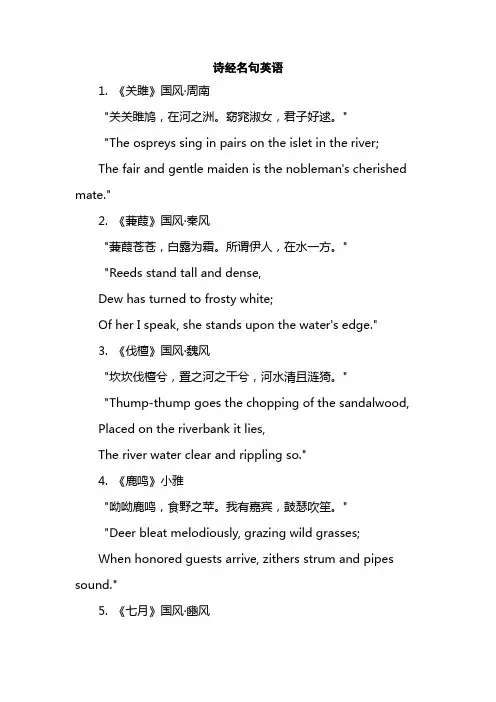
诗经名句英语1. 《关雎》国风·周南"关关雎鸠,在河之洲。
窈窕淑女,君子好逑。
""The ospreys sing in pairs on the islet in the river;The fair and gentle maiden is the nobleman's cherished mate."2. 《蒹葭》国风·秦风"蒹葭苍苍,白露为霜。
所谓伊人,在水一方。
""Reeds stand tall and dense,Dew has turned to frosty white;Of her I speak, she stands upon the water's edge."3. 《伐檀》国风·魏风"坎坎伐檀兮,置之河之干兮,河水清且涟猗。
""Thump-thump goes the chopping of the sandalwood, Placed on the riverbank it lies,The river water clear and rippling so."4. 《鹿鸣》小雅"呦呦鹿鸣,食野之苹。
我有嘉宾,鼓瑟吹笙。
""Deer bleat melodiously, grazing wild grasses;When honored guests arrive, zithers strum and pipes sound."5. 《七月》国风·豳风"七月流火,九月授衣。
一之日觱发,二之日栗烈。
" "In the seventh month, Sirius descends;By the ninth, winter clothes are given out.On the first day, the north wind blows fiercely, On the second, it bites coldly."。
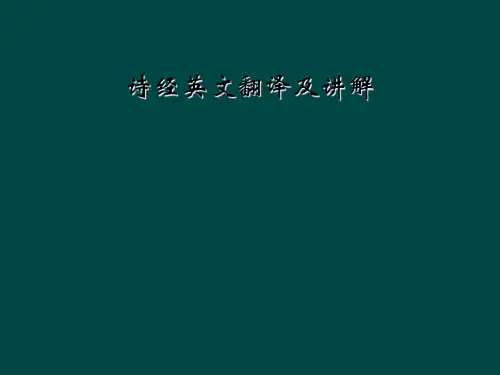
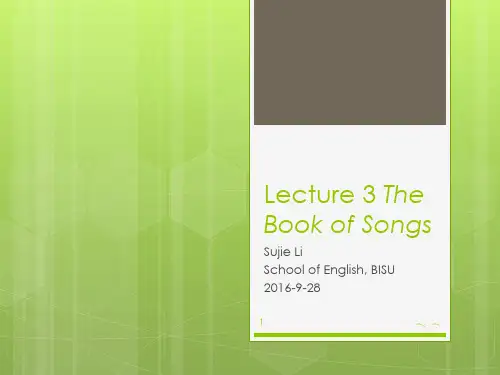
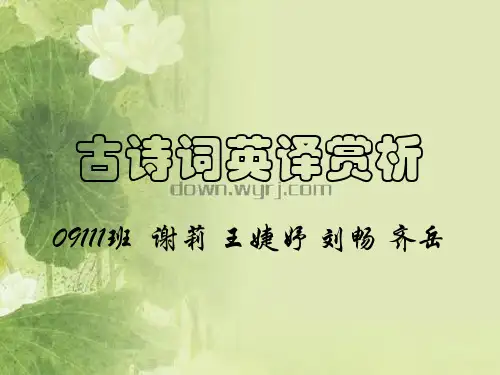
诗经英文版本《诗经》是中国古代的一部诗歌集,其中包含了许多经典的诗歌作品。
以下是其中一些著名的诗歌及其英文版本:1. 《关雎》(Guanzi):这是《诗经》中的开篇之作,也是中国文学史上最古老的诗歌之一。
以下是它的英文版本:"Guan Zi" (Chinese)Original Text:关关雎鸠,在河之洲。
窈窕淑女,君子好逑。
Translation:The cranes call to each other,By the river's marshy banks.Beautiful maidens graceful,Are the lover's delightful choice.2. 《桃夭》(Tao Yao):这是一首描写桃花盛开的美丽景象的诗歌,以下是它的英文版本:"Tao Yao" (Chinese)Original Text:桃之夭夭,灼灼其华。
之子于归,宜其室家。
Translation:The peach blossoms blaze with beauty,Their radiance bright as day.That man is one to wed,A perfect match for any lady.3. 《蒹葭》(Jian Jia):这是一首描绘了河边芦苇的诗歌,以下是它的英文版本:"Jian Jia" (Chinese)Original Text:蒹葭苍苍,白露为霜。
所谓伊人,在水一方。
溯洄从之,道阻且长。
溯游从之,宛在水中央。
Translation:The reeds are so green,The morning dew turns to frost.The lady I seek,Standing on the riverbank, far away.To follow her upstream,The path is long and winding.To follow her downstream,She seems to be in the middle of the river.定。
中秋诗歌《诗经》英语版我思断肠,伊人不臧。
Alas my love, you do me wrong弃我远去,抑郁难当。
To cast me off discourteously我心相属,日久月长。
I have loved you all so long与卿相依,地老天荒。
Delighting in your company绿袖招兮,我心欢朗。
Greensleeves was all my joy绿袖飘兮,我心痴狂。
Greensleeves was my delight绿袖摇兮,我心流光。
Greensleeves was my heart of gold 绿袖永兮,非我新娘。
And who but my Lady Greensleeves 我即相偎,柔荑纤香。
I have been ready at your hand我自相许,舍身何妨。
To grant whatever you would crave 欲求永年,此生归偿。
I have both waged life and land回首欢爱,四顾茫茫。
Your love and good will for to have 绿袖招兮,我心欢朗。
Greensleeves was all my joy绿袖飘兮,我心痴狂。
Greensleeves was my delight绿袖摇兮,我心流光。
Greensleeves was my heart of gold 绿袖永兮,非我新娘。
And who but my Lady Greensleeves 伊人隔尘,我亦无望。
Thou couldst desire no earthly thing 彼端箜篌,渐疏渐响。
But still thou hadst it readily人既永绝,心自飘霜。
Thy music still to play and sing斥欢斥爱,绿袖无常。
And yet thou wouldst not love me绿袖招兮,我心欢朗。
一些《诗经》里的诗英译赏析(2)一些《诗经》里的诗英译赏析理译:And no one knows our sadness.At first, when we set out,The willows were fresh and green;Now, when we shall be returing,The snow will be falling in clouds.许译:When I left here,Willows shed tear.I come back now,Snow bends the bough.解析:两种译本通过不同的诗歌形式,都保留了原诗的意义。
理雅各的译本提供了大量详细注释和评论,读起来更像散文,具有很高的学术价值。
而许渊冲的译本通过运用韵律,在保留原诗美学的同时,韵脚工整,格律严格。
原诗结构一致,讲究押韵。
理雅各严格遵守原诗的句子结构和顺序,但没有押韵,读起来更像是富有乐感散文。
许渊冲煞费苦心来保留原诗音韵美,译文韵律格式采用:AABBCC,每行四个音节,双行押韵,且语言力求简短。
《国风·召南·野有死麕》野有死麕,白茅包之。
有女怀春,吉士诱之。
林有朴樕,野有死鹿。
白茅纯束,有女如玉。
舒而脱脱兮,无感我帨兮,无使尨也吠。
理译:In the wild there is a dead antelope, And it is bound round with the white grass.And it is wrapped up with the white grass. There is a young lady like a gem.There is a young lady with thoughts natural to the spring, [She says], Slowly, gently, gently;And a fine gentleman would lead her astray. Do not move my handkerchief;In the forest there are th scrubby oaks; Do not make my dog bark.In the wild there is a dead deer,许译:An antelope is killed He sees the white-drest maidAnd wrapped in white afield. As beautiful as jade.A maid for love does long, “O soft and slow, weetheart,Tempted by a hunter strong. Don't tear my sash apart!"He cuts down trees amain The jadelike maid says,"Hark!And kills a deer again. Do not let the dog bark.解析:从译文可以看出理译和许译对主题的理解十分不同。
对于诗经的理解与感悟英语作文The Shijing: An Enduring Legacy of Chinese Poetry and Culture.The Shijing, or Book of Songs, is an ancient anthologyof Chinese poetry that has captivated generations ofreaders for centuries. Compiled during the Zhou dynasty (c. 1046-256 BCE), the Shijing encompasses a vast corpus ofover 300 poems, ranging from folk songs and ballads to courtly hymns and ritual odes. As a seminal text in Chinese literature, the Shijing holds immense cultural andhistorical significance, providing invaluable insights into the lives, beliefs, and traditions of ancient China.Literary and Artistic Value.The Shijing showcases the extraordinary artistry and linguistic prowess of its creators. The poems employ a rich and expressive language, utilizing vivid imagery, metaphors, and allusions to convey emotions, depict scenes, andnarrate stories. The careful use of rhyme, rhythm, and repetition creates a musical quality that enhances the poems' aesthetic appeal. Moreover, the Shijing influenced the development of subsequent Chinese poetic forms, such as the Tang and Song dynasties' regulated verse, and continues to inspire contemporary poets and writers.Historical and Social Insights.Beyond its literary merits, the Shijing serves as an invaluable historical document. The poems offer a window into the social, political, and religious life of ancient China. They provide glimpses of everyday experiences, from farming and fishing to courtship and warfare. Courtly odes document the rituals, ceremonies, and political events that shaped the Zhou dynasty. By studying the Shijing, we can better understand the beliefs, values, and aspirations of the ancient Chinese people.Folkloric and Cultural Traditions.The Shijing contains a wealth of folkloric elementsthat reflect the beliefs and customs of the Chinese peasantry. Many poems feature mythical figures, supernatural beings, and ancient legends. They preserve folk songs and ballads that provide insights into the oral traditions and storytelling practices of the time. By studying the Shijing, we can trace the origins of many Chinese cultural traditions and festivals that are still celebrated today.Themes and Motifs.The Shijing explores a wide range of themes, including love, loss, war, nature, and social commentary. Love poems celebrate the joys and sorrows of romantic relationships, while elegies mourn the loss of loved ones. War poems depict the horrors and triumphs of battle, while nature poems capture the beauty and wonder of the natural world. Social commentary poems critique the injustices and inequalities of society, offering insights into the political and economic conditions of the time.Interpretation and Reception.The Shijing has been subjected to numerous interpretations throughout history. Confucian scholars viewed it as a source of moral teachings and political wisdom, while later scholars focused on its literary and aesthetic qualities. In the 20th century, it became the subject of extensive philological and historical research. Today, the Shijing is widely studied by scholars, students, and literary enthusiasts around the world.Cultural Significance and Legacy.The Shijing has played a profound role in shaping Chinese culture and identity. It has influenced the development of Chinese literature, art, and music. Its poems have been used in educational curricula, religious ceremonies, and cultural performances for centuries. The Shijing continues to inspire contemporary artists, musicians, and writers, who find new ways to interpret and reinterpret its timeless themes.Conclusion.The Shijing is an extraordinary literary and cultural artifact that has endured for centuries. Its poems offer a unique and invaluable window into the ancient Chinese world, providing insights into the beliefs, values, and traditions of the Chinese people. As a seminal text in Chineseliterature and a testament to the enduring power of poetry, the Shijing continues to resonate with readers today, inspiring and enriching our understanding of human history and experience.。
《诗经》英文版|蒹葭苍苍,白露为霜
蒹葭苍苍,白露为霜。
所谓伊人,在水一方。
Green, green the reed.
Dew and frost gleam.
Where’s she I need.
Beyond the stream.
溯洄从之,道阻且长。
溯游从之,宛在水中央。
Upstream I go.
the way is long.
Downstream I go.
She’s there among.
蒹葭萋萋,白露未晞。
所谓伊人,在水之湄。
White, white the reed.
Dew not yet dried.
Where’s she I need.
On the other side.
溯洄从之,道阻且跻。
溯游从之,宛在水中坻。
Upstream I go.
Hard is the way. Downstream I go. She’s far away.
蒹葭采采,白露未已。
所谓伊人,在水之涘。
Bright, bright the reed. Dew and frost blend. Where’s she I need. At river’s end.
溯洄从之,道阻且右。
溯游从之,宛在水中沚。
Upstream I go.
The way does wind. Downstream I go. She’s far behind.。
诗经中的句子以及英语作文使用主题Thematic Usage of Shijing Verses in English Essays.The Shijing, also known as the Classic of Poetry, is an ancient Chinese anthology of poems that has profoundly influenced Chinese literature and culture. Its verses have been extensively employed in English essays for centuries, adding depth, nuance, and cultural context to a wide range of themes.Cultural Heritage and Identity.Shijing verses evoke a sense of cultural heritage and national identity. By incorporating them into English essays, writers can connect their arguments to a long and respected tradition. For example, a verse from the poem "Guanju" (关雎) reads:> 关关雎鸠,在河之洲。
窈窕淑女,君子好逑。
This verse celebrates the beauty and virtue of a young woman, and it has been used in English essays to explore themes of love, marriage, and family. By referencing this verse, writers can tap into the shared cultural heritage of their readers and establish a sense of common ground.Nature and the Human Condition.Shijing verses often depict the natural world and its relationship to human life. The poem "Bei Feng" (北风) laments the harshness of winter:> 北风其喈,雨雪其霏。